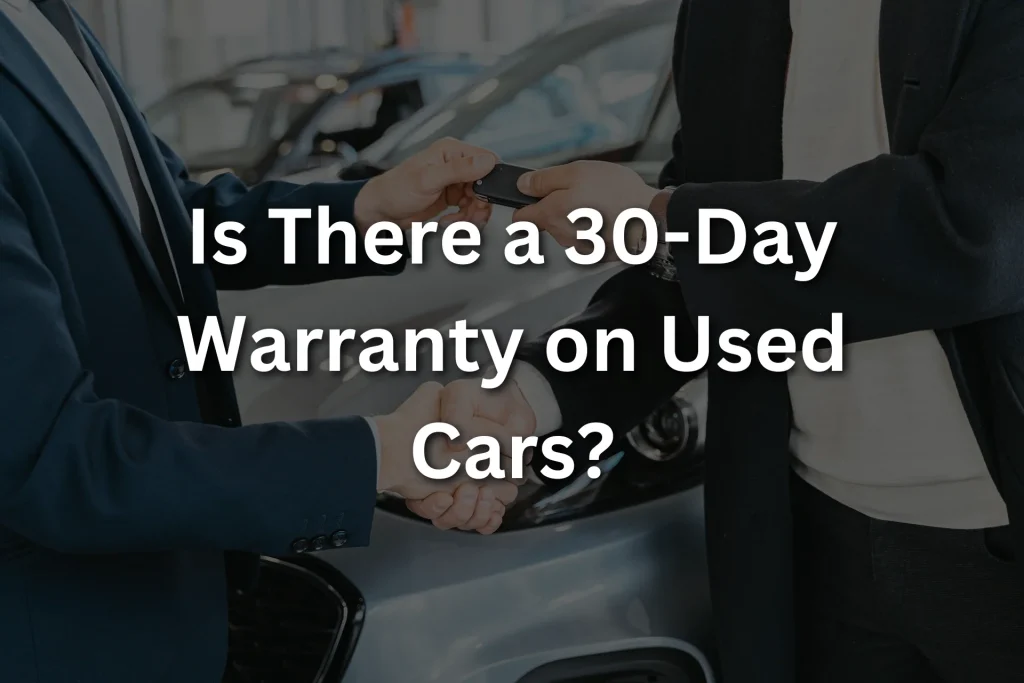
When you’re buying a used car in California, understanding warranty protection in the context of car sales can save you from significant headaches and repair costs down the road. The car lemon law provides legal protections available to consumers who purchase or lease defective vehicles. While not every used car comes with a warranty, California law provides specific protections for buyers, including rules about warranties and rights to pursue claims when vehicles don’t meet standards.
At Consumer Action Law Group, we’ve helped countless car buyers understand their rights when it comes to used car warranties. Our legal team works with clients across California who face issues after purchasing used vehicles, and we offer free initial consultations to discuss your situation.
Understanding Your Rights Before Purchase
Before signing any paperwork on a used car, California law grants you specific rights as a buyer. These rights begin the moment you start looking at vehicles and continue through the entire purchase process. Dealers must provide clear information about any warranty coverage, vehicle history, and known mechanical problems. It is crucial to verify the warranty details with the car’s manufacturer to understand the coverage and any conditions that may apply.
State law requires dealers to post a buyer’s guide on every used car for sale. This document tells you whether the car comes with a warranty or if it’s being sold “as is.” The guide must also list major mechanical and safety systems, suggesting you get an independent inspection before purchase. Dealers must also provide a written warranty that clearly outlines the terms and conditions of any warranty coverage offered.
Many buyers don’t realize they have the right to take any used vehicle to an independent mechanic before finalizing the purchase. A dealer who refuses this reasonable request raises red flags about potential issues they might be trying to hide.
What is a Car Warranty?
A car warranty is a legally binding promise from the manufacturer or seller to cover repair costs and replacements for specific vehicle components during a set period or mileage. Think of it as a safety net that protects your investment when certain parts fail or malfunction. While warranties come in different forms, they all serve one primary purpose: to provide financial protection against defects that weren’t caused by the owner’s actions.
The warranty document specifies which parts are covered, for how long, and under what conditions. This protection can range from covering just the essential components to comprehensive “bumper-to-bumper” coverage. Understanding your warranty helps you avoid unexpected repair costs and know when to claim coverage for repairs.
Types of Used Car Warranties in California
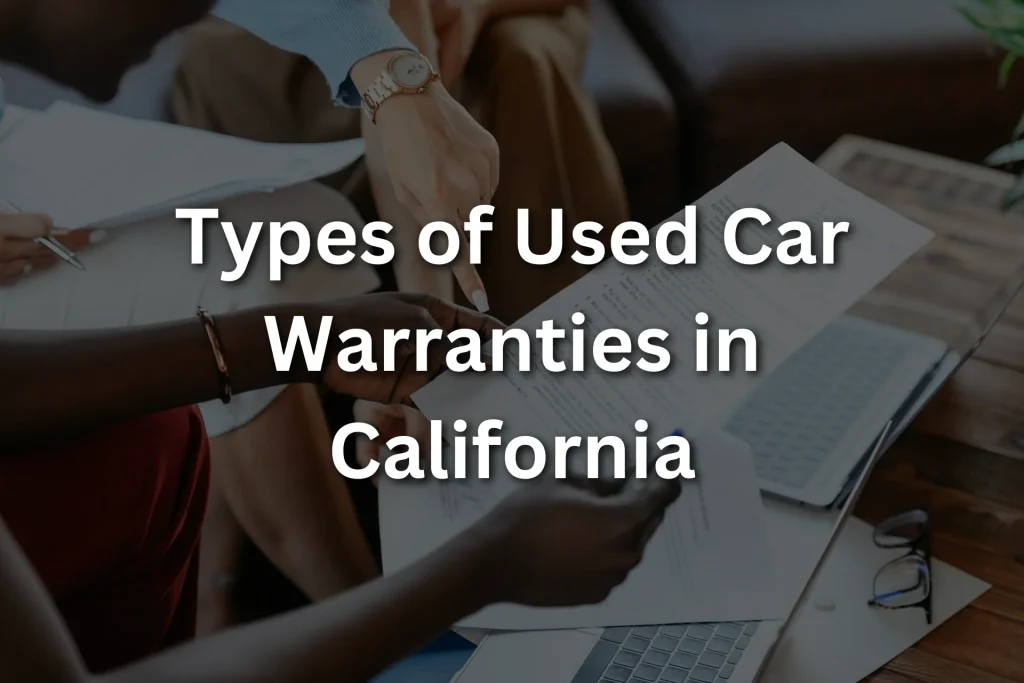
Basic dealer warranties protect your most essential vehicle systems. When you purchase a used car from a dealership, these warranties typically last 30 to 90 days and focus on crucial components that affect your car’s basic operation and safety.
Manufacturer’s Warranty Coverage
A manufacturer’s warranty often provides the most comprehensive protection for used cars. If your used vehicle is still within its original warranty period, this coverage transfers to you as the new owner. These warranties typically include:
- Bumper-to-bumper protection for major systems
- Powertrain coverage extending to 60,000 miles or beyond
- Separate coverage periods for different vehicle components
The remaining coverage depends on your vehicle’s age and mileage. Keep detailed service records to maintain this valuable protection.
Implied Warranty Protection
Implied warranties come automatically with every used car sale in California unless explicitly disclaimed in writing. This protection guarantees that:
- The vehicle is fit for ordinary driving purposes
- The car matches all promises made during the sale
- The dealer has properly disclosed the vehicle’s condition
Even in “as is” sales, certain implied warranty rights may still apply under California law.
Extended Warranties and Service Contracts
Extended warranties provide additional coverage beyond the manufacturer’s warranty period. When considering the extended warranty, it’s important to weigh the cost versus potential benefits, such as the reliability of the vehicle and past mechanical issues. Also known as service contracts, these optional plans can:
- Extend protection for several years or thousands of miles
- Cover components not included in basic warranties
- Offer extra benefits like roadside assistance
- Provide coverage through the manufacturer, dealer, or third party
Understanding the Buyer’s Guide
Federal law mandates that dealers display the buyer’s guide prominently in every used vehicle. This document serves as more than just a formality – it’s a legally binding part of your sales contract, even if not explicitly mentioned in other paperwork.
The buyer’s guide must list major defects that could occur in used cars. This includes problems with the engine, transmission, drivetrain, brake system, steering, and other crucial components. Dealers must use clear language to describe warranty terms and conditions.
Pay special attention to the percentage of repair costs covered under warranty. Some warranties split costs between dealer and buyer, with percentages varying by component or repair type. Make sure you understand these terms before purchasing.
“As Is” Sales: What You Need to Know
When dealers sell cars “as is,” they must clearly state this in the buyer’s guide and sales contract. However, “as is” sales don’t completely eliminate your rights under California law. Dealers must still disclose known defects and can’t misrepresent the vehicle’s condition.
Even in “as is” sales, implied warranties may still apply unless properly disclaimed. If a dealer makes specific promises about the car’s condition or functionality during the sale, these statements can create an express warranty, regardless of “as is” language in the contract.
Required Dealer Disclosures
California law mandates specific disclosures from dealers selling used cars. These go beyond basic warranty information to include accident history, previous damage, and any branded titles. Failing to provide these disclosures can give buyers legal grounds for action.
Dealers must inform buyers about prior use as rental vehicles, police cars, or taxi services. They also must disclose any frame damage, flood damage, or significant repairs. This information helps buyers make informed decisions about vehicle value and potential future issues.
Written disclosures should match all verbal statements made during the sale. When discrepancies occur between written and verbal claims, buyers gain additional rights under consumer protection laws.
Common Warranty Terms and Conditions
Understanding warranty language helps prevent future disputes. Terms like “reasonable repair time” and “substantial defect” have specific legal meanings that affect your rights. Warranty documents should clearly define these terms and explain how they apply to your coverage.
Most warranties require buyers to maintain their vehicles according to the manufacturer’s schedule. Missing regular maintenance can void warranty coverage, even for unrelated problems. Keep detailed records of all service work to protect your warranty rights.
Service contracts often include specific claim procedures. Following these procedures exactly helps ensure coverage for qualified repairs. Missing steps in the process could result in denied claims, even for otherwise covered repairs.
Signs of Warranty Fraud
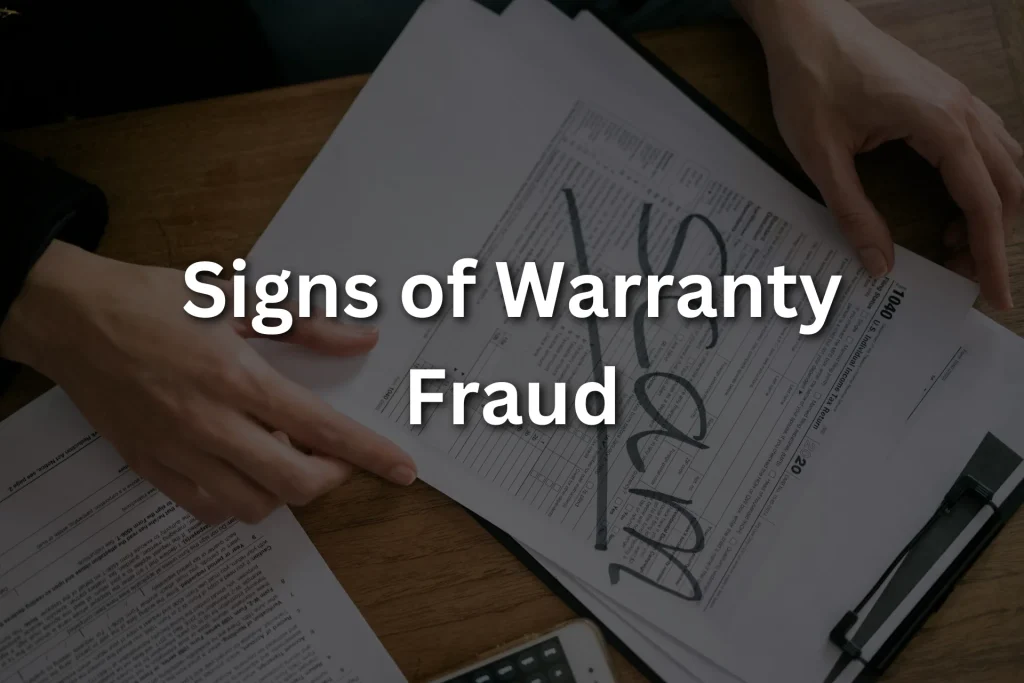
Deceptive warranty practices occur more often than many buyers realize. Common red flags include dealers who pressure you to buy additional coverage without providing written terms or those who make verbal promises that differ from written warranties.
Missing or incomplete warranty documentation suggests potential fraud. Legitimate warranties always come with detailed written terms. Be wary of dealers who claim they’ll “take care of any problems” without specifying coverage terms in writing.
Warranty fraud often involves misrepresenting coverage limits or repair obligations. Some dealers might claim certain repairs fall outside warranty coverage when they’re actually protected. Understanding your coverage helps you recognize these deceptive practices.
What’s Covered Under Different Warranties
Basic warranty coverage typically includes the engine, transmission, and major mechanical systems. More comprehensive warranties might add electrical systems, air conditioning, and power components. Premium coverage could extend to electronic features and comfort systems.
Powertrain warranties focus on components that make the car move: engine, transmission, and drive axles. These warranties often last longer than basic coverage because they protect essential mechanical parts.
Certified pre-owned warranties combine inspection requirements with coverage guarantees. These programs typically offer more protection than standard used car warranties but come with strict maintenance requirements.
Components Covered
When purchasing a used car, understanding the components covered under the warranty is crucial. Typically, a used car warranty includes coverage for essential systems such as the engine, transmission, and drivetrain. These components are vital for the vehicle’s basic operation and safety, making their coverage a significant benefit.
In addition to these core systems, many warranties also cover the electrical, heating, and cooling systems. These elements are essential for the vehicle’s functionality and comfort, ensuring that you can rely on your car in various conditions.
However, it’s important to note that not all components are covered under every warranty. Items like tires, brake pads, and windshield wipers, which are subject to regular wear and tear, are often excluded. To avoid surprises, carefully review the warranty documents provided by the dealer. Understanding what is included and what is excluded helps you make informed decisions and ensures you know what to expect in terms of warranty coverage for your used car.
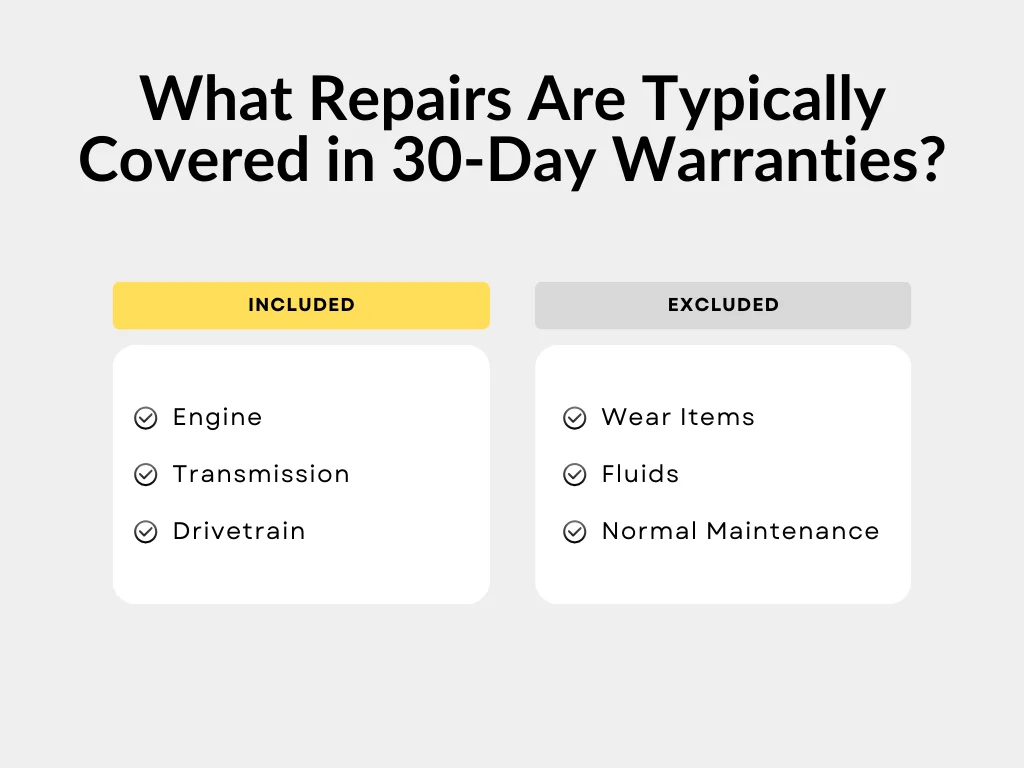
Warranty Exclusions and Limitations
Most warranties exclude wear and tear items like tires, brake pads, and windshield wipers. Normal maintenance services, including oil changes and tune-ups, typically fall outside warranty coverage. Understanding these exclusions prevents surprises when repair needs arise.
Time and mileage limitations affect all warranty types. Coverage ends when you reach either the time or mileage limit, whichever comes first. Some warranties include deductibles for each repair visit, while others might limit the total amount they’ll pay for specific repairs.
California Lemon Law Protection
The state’s lemon law applies to both new and used cars under warranty. For used vehicles, protection typically covers cars still under manufacturer warranty or those with dealer-provided coverage. The law requires dealers to make reasonable attempts to repair substantial defects.
To qualify for lemon law protection, document all repair attempts and communications with the dealer. The law defines a “reasonable number” of repair attempts based on the problem’s severity. Safety-related issues might qualify after fewer attempts than less critical problems.
Successful lemon law claims can result in vehicle replacement or a refund of the purchase price. The law also covers attorney fees in many cases, making legal representation more accessible for affected buyers.
Documenting Warranty Issues
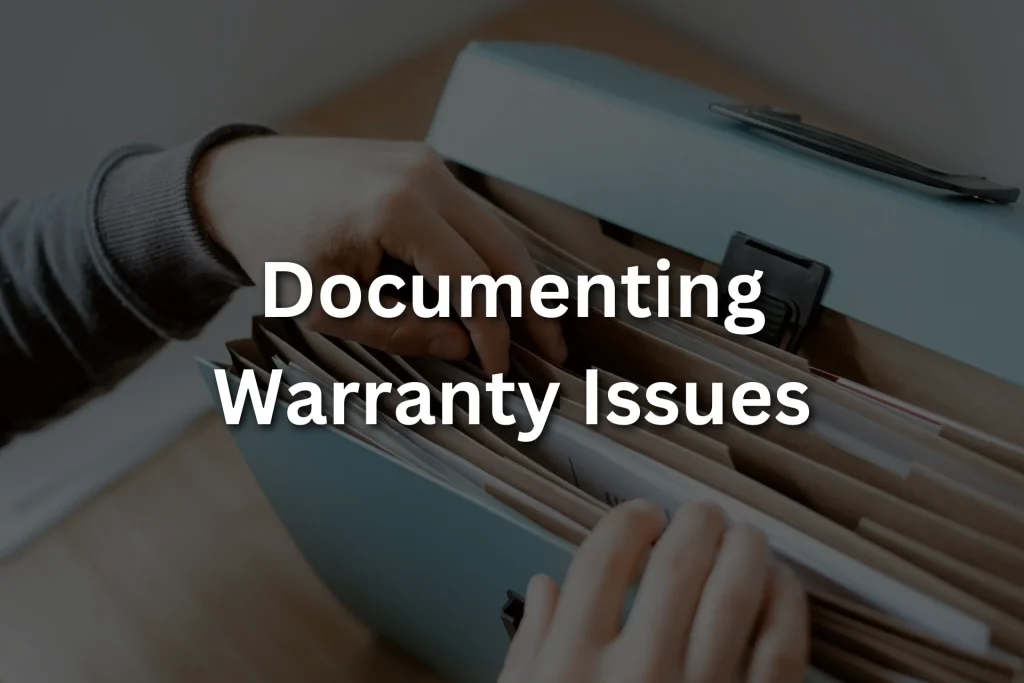
Create a detailed record of any problems that arise with your used vehicle. Include dates, descriptions of issues, repair attempts, and all communications with the dealer. Take photos or videos of problems when possible to support your documentation.
Save all repair orders, receipts, and correspondence related to warranty repairs. These records prove essential if disputes arise about coverage or repair quality. Note any conversations with service personnel, including names and dates.
Filing a Warranty Complaint
When warranty disputes arise, start by filing a formal complaint with the dealer’s service department. Put your concerns in writing and keep copies of all correspondence. If the dealer fails to address the issue, escalate to the manufacturer if their warranty applies.
The California Bureau of Automotive Repair handles complaints about warranty repairs and service contracts. They can investigate potential violations and mediate disputes between buyers and dealers.
Extended Service Contracts
Service contracts offer additional protection beyond standard warranties, but carefully evaluate their value before purchasing. These contracts often cost several thousand dollars and may duplicate coverage you already have through manufacturer or dealer warranties.
Review the contract’s coverage period, systems covered, and repair facility requirements. Some contracts restrict where you can get repairs done, while others allow more flexibility. Consider the contract administrator’s reputation and financial stability before signing.
Many service contracts include waiting periods before coverage begins. During this time, you’re paying for protection you can’t use. Calculate the total cost, including deductibles and excluded services, to determine if the contract makes financial sense.
Private Seller vs. Dealer Warranties
Buying from private sellers differs significantly from dealer purchases regarding warranty rights. Private sales typically come “as is” without warranty protection. However, private sellers must still disclose known defects and can’t misrepresent the vehicle’s condition.
Dealer sales offer more warranty protections under state and federal law. Even without written warranties, dealer sales include certain implied protections unless specifically disclaimed. Understanding these differences helps you choose the best purchase option for your situation.
Protecting Your Long-term Rights
Maintain comprehensive records throughout your ownership period. Keep a file containing the original sales contract, warranty documents, service records, and any correspondence about repairs. Good records strengthen your position if warranty disputes arise.
Regular maintenance according to the manufacturer’s schedule protects both your vehicle and your warranty rights. Document all maintenance, even for services not covered by warranty. These records prove you’ve met warranty requirements for vehicle care.
Consider having independent inspections performed before warranty expiration. These inspections can identify potential problems while coverage remains active. Address any issues promptly to ensure warranty coverage applies.
When Problems Persist
Some warranty issues require persistent follow-up with dealers or manufacturers. Document every contact attempt and keep detailed notes about responses received. Build a clear timeline of your efforts to resolve problems under warranty.
If initial attempts to resolve issues fail, consider involving state consumer protection agencies. The California Department of Consumer Affairs offers resources for car buyers facing warranty disputes. Their involvement often motivates dealers to address legitimate warranty claims.
Taking Legal Action
When other resolution attempts fail, legal action might become necessary. Consumer protection laws provide various remedies for warranty violations, including monetary damages and attorney fee recovery in many cases.
Our team at Consumer Action Law Group understands the frustration of dealing with warranty disputes. We offer free consultations to evaluate your situation and explain available legal options. With experience in both warranty and lemon law claims, we help clients throughout California protect their rights.
Remember, warranty issues affect both your vehicle’s reliability and your financial security. Don’t hesitate to seek professional help when dealing with persistent warranty problems. Contact us today to discuss your situation and learn how we can help resolve your warranty concerns.













